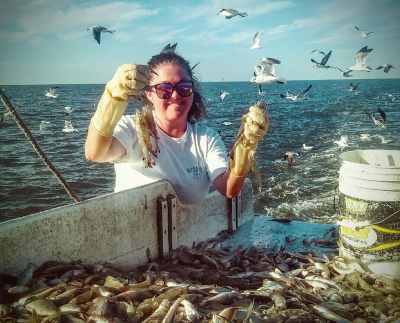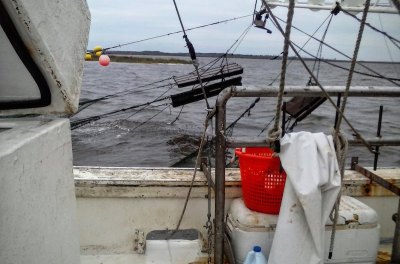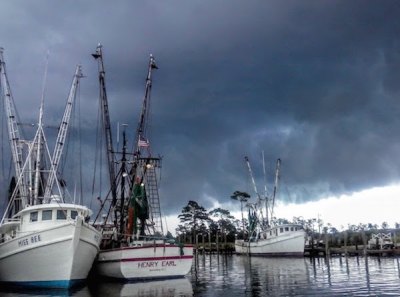In an industry where commerce depends solely on the catch, commercial fishing is one of the most volatile professions in the country. From market prices to weather patterns, there are many factors that could result in poor landings and scant pay check. On top of these factors, an environmental group has proposed drastic rule changes for the trawl industry that could shut down a the NC shrimping business completely. And they’re spending big money to do it.
Non-profit group NC Wildlife Federation (NCWF), whose mission is “environmental stewardship,” has submitted a 99-page petition for trawling rule change to the NC Marine Fisheries Commission. Suggested rules include implementing a 3-day work week, limiting tow times and designating the entire inland waters, as well as 3 miles into the ocean, as primary nursery areas. Stakeholders say the drastic measures would shut down the trawling fishery and take shrimp off our tables.
The MFC will decide whether or not to accept the petition at their business meeting in Wilmington, February 15-16.
NCWF, along with their attorney from the Southern Environmental Law Center (SELC), presented their petition to five advisory groups to the Marine Fisheries Commission during a meeting in New Bern on January 17. Repeatedly, they admitted that they did not have the figures to show how the proposed rules would affect our state’s economy. Actually, that information was left out of their proposal completely. “We are not in a position to address economic impacts,” admitted Blakely Hildabrand, associate attorney for SELC.
While they claimed the rules would have an impact on the captains and crews, the environmentalists left out the many jobs generated by the trawl industry. From the shrimp headers and dock hands, to the welders and marine mechanics, to the transport drivers and seafood distributors, as well as the administrative employees, North Carolina stands to lose big bucks if fresh shrimp is taken from our tables. Even bigger, the tourism industry – which is has been a huge economic supporter in distressed coastal communities – would certainly take a financial hit.
As someone who makes her living in the tourism industry, I can attest that local seafood is a draw for visitors. I’ve seen folks from Ohio turn their nose up when I told them the snow crab legs weren’t local. As a freelance writer and author of a counter-petition to oppose the NCWF proposal, many visitors that signed my petition named fresh, local seafood as a top priority during their visit.

First of all, a low-end suit and tie costs roughly $425 (according to Men’s Wearhouse, the average three-piece suit is $700, but if you figure in their buy-one-get-one for $150). So, it's safe to deduce that environmentalists wear a different suit every day. So, a $425 suit for 5 days a week, as well as a $20 tie and a $30 shirt each day, equates to a wardrobe of $2,375 a week. Thinking of footwear, a pair of leather Oxfords cost $115 on Amazon. So, adding in two pairs of shoes, that brings the weekly wardrobe of an environmentalist to $2,605.
Assuming that a professional wants a month's worth of clothing (wearing each suit twice each month), that brings the annual total for one environmentalist’s attire to $7,815.
Zack Davis, a shrimp boat captain from Marshallberg wore a suit and tie to the January meeting. “I only wear suits in sticky situations,” he said. “Weddings, funerals and fishery meetings.” Davis, who holds two college degrees and is also an agriculture teacher at Carteret County Schools, presented 21 years of captain logbooks, as well as generations of his family’s fishermen knowledge, to say that the NCWF petition is not only based on biased science, but it would destroy the age-old industry.
Looking at the fisherman’s wardrobe, a pair of Grundens – overalls and a slicker with a hood – costs around $400, plus a good pair of boots for $100. Add in a monthly allowance for thick socks ($40), long-johns ($20), jeans ($40) and t-shirts ($20) and that brings the annual wardrobe for a commercial fisherman to a total to $2,180 – about the weekly total of the environmentalist. A suit and tie can’t be sprayed off after work, like Grundens.
A fishermen can never clock in and be assured of a good paycheck, but environmentalists sure can. According to John Hopkins University there is huge money in being an environmentalist. In 2016, a it was reported a "chief sustainability environmental executive" will earn an average of $166,000 annually, while a general operations managers will start at $95,150.

According to onemarketmedia.com, most production companies will charge between $75/hour and $150/hour for the people involved in key activities such as shooting, editing and directing a corporate video. Saying three professionals are involved in the production of a video, $300 per hour is a fair guess. And 15 hours to produce a professional product could be considered a low-end estimate. This equates to $4,500. NCWF has two videos to market their plight to shut down the shrimping industry, totalling a very modest estimate of $9,000.
Outdoor signage with graphic images can cost anywhere from $5,000 to $10,000 monthly, not including artwork. To produce the image, artwork starts at $1,000. Taking the low average, $8,500 for an outdoor billboard is a reasonable number for a month, according to lamar.com. For a six-month campaign, the cost totals $51,000.
But the most astonishing number is the money spent on the petition that NCWF has presented to the Marine Fisheries Commission. An article in Island Free Press (September 13, 2013) says the hourly billing rate for Southern Environmental Law Center is $890. But taking the low-end estimate, the National Law Journal says the average hourly billing rate for associate firms is roughly $350. Supposing a total of three hours was spent on each page of the NCWF petition, this damaging 99-page document cost around $105,000. Tack on an additional 15 hours for consultation, promotion and presentation, and that brings the total to $110,250. (Using the figure from Island Free Press would bring the number to $277,680)
So, let's add up the costs of a mere two environmentalists, their clothes, their propaganda money and the costs to draw up this petition – all in the name of shutting down a historic industry that provides food and jobs to NC residents and visitors – and the total comes to a whopping $511,735. Again, this is a low-end estimate and this doesn’t include several other factors, including salaries of additional employees, technical costs, travel, advertising costs or lobbying.
NC Catch comprised a video of “catch math” that adds up the facts about how the NCWF petition would affect people’s dinner table. Check it out and learn how this would affect your dinner table.
The MFC will hear more public comments before taking the final vote on the petition at their business meeting at the Hilton Wilmington Riverside, 301 N. Water St., Wilmington on February 15-16.
To help oppose the NCWF proposal, please sign the change.org petition, which will be presented to the MFC at their meeting.
